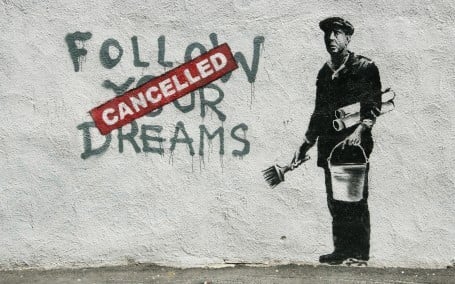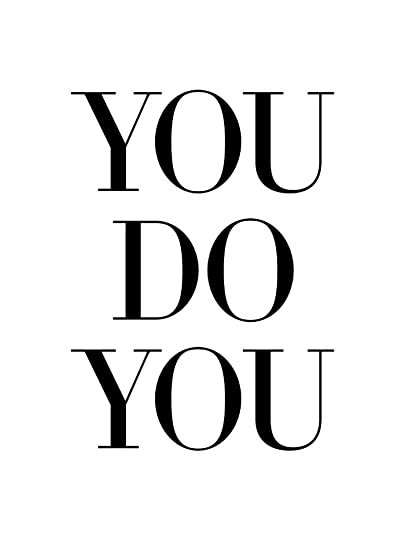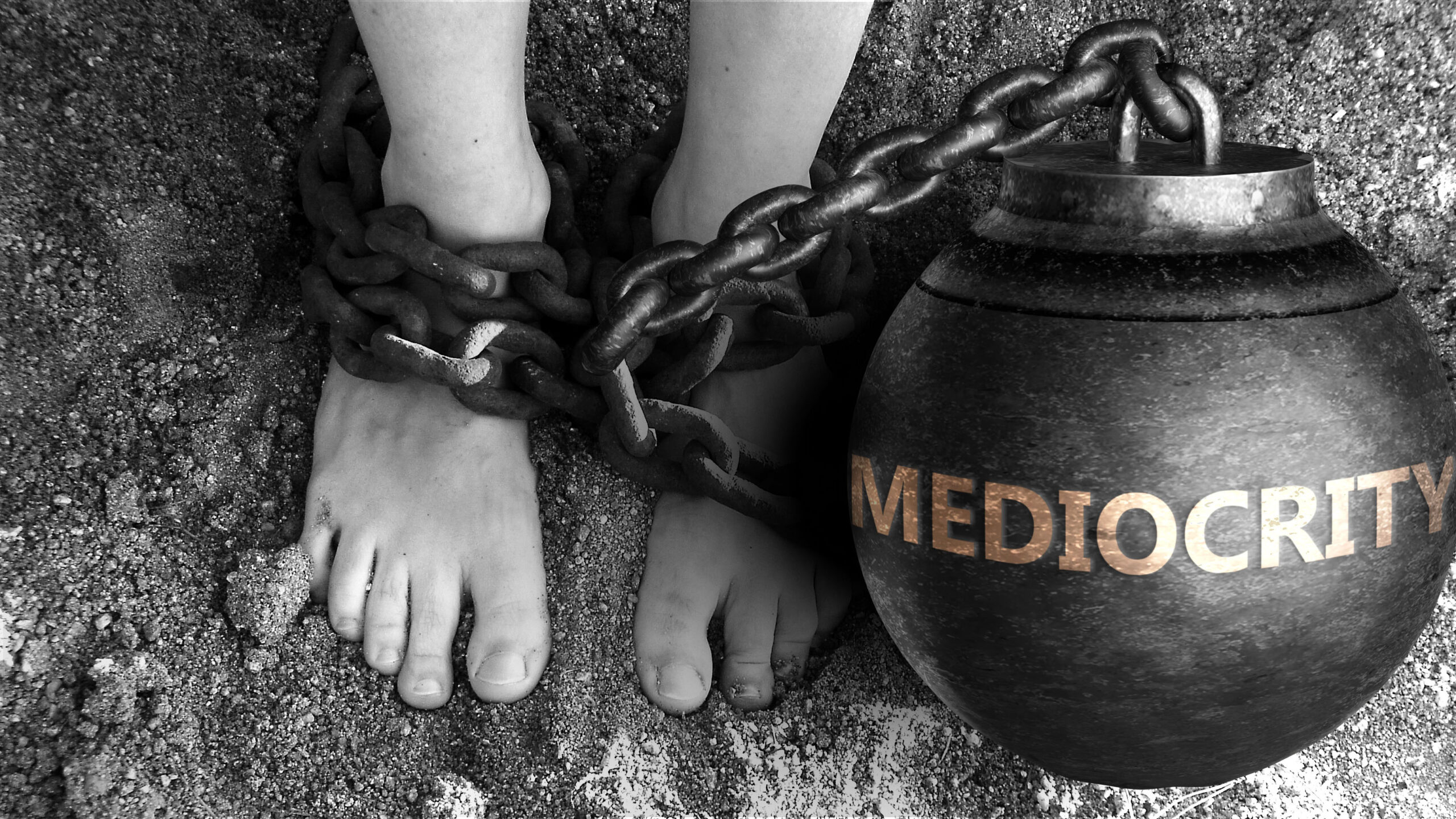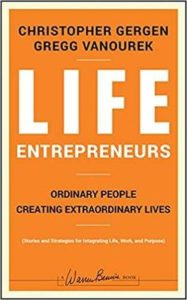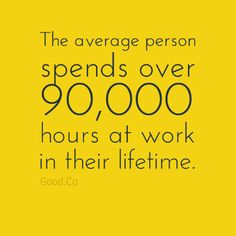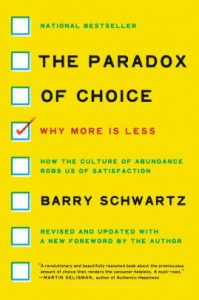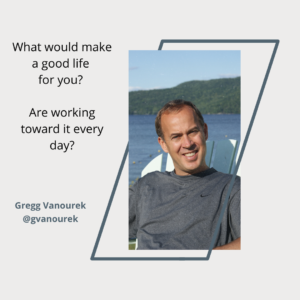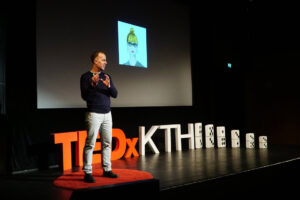One of the most common—and costly—traps of living is the trap of deferring dreams and postponing happiness. We do it, we tell ourselves, because it’s not practical or “the right time.”
So what happens in the meantime? We endure work without enjoying it. Or we suffer through the days. We become resigned to the dysfunctions of our work, and habituated to its anxiety and stress. Or we sacrifice health, family, and dreams for the job. We neglect precious relationships with family and friends with the rationalization that we’ll make up for it later.
We wait. Hmmm….
Deferring Dreams: Waiting for that “Perfect Time”
“People wait. They wait for the elusive day when they’ll finally have enough time (guess what? — you never will), enough education (there’s always more to know), enough money (no matter how much you make, someone will always have more)…. People wait until that fateful day when they wake up and realize that while they were sitting around paying dues, earning their keep, waiting for that elusive ‘perfect time’ their entire life has passed them by.”
-Richie Norton, The Power of Starting Something Stupid
For some, this means enduring a mediocre or even miserable, stress-filled present on the bet that if we keep grinding it out today (this year… this decade…), we’ll magically arrive in happiness heaven at some point.
Don’t misunderstand: hard work is good. Paying dues can be valuable. We’re not all blessed with options.
But here’s the reality: If we spend our days deferring our dreams and postponing our happiness, then our life will be, well, one of deferred dreams and postponed happiness. Too often, the dreams and happiness never materialize. We put them off until it’s too late, or we burn up too much time in deferral mode.
Life is too precious and short to wait.
It comes with unknown contents and duration.
Is it really worth the wait?
According to Emma Seppäla of the Yale School of Management, “This theory of success, the idea that in order to be successful you have to postpone or sacrifice your happiness, is simply false.”
Deferring Dreams: Why Is This So Hard?
Of course, we understand the dangers here conceptually, yet we still end up falling into this trap of waiting, deferring, and postponing. Why?
First, we undervalue ourselves, subconsciously believing we’re so flawed that we’re not yet worthy of happiness. Sometimes, we learn these self-beliefs or worldviews from our family, born in a different time or with a different outlook.
Second, we fear failure. Our brains are wired for it. We submit to our risk aversion. As we mull our decision whether to wait or go for it, we overweight the cost of potential failure while underweighting the value of failure (from what we’ll learn and the pride we’ll feel for having tried) and neglecting altogether the cost of regret (the anguish associated with looking back and wondering about missed chances).
Third, we’re paralyzed by uncertainty about how to venture forth into the murky territory of our hopes and dreams. There are a couple factors at work here:
- The “paradox of choice” (with anxiety coming from choice overload, causing “analysis paralysis”), as noted by psychologist Barry Schwartz
- The belief that we have to find the one “perfect idea” and make the one “right choice,” with advance certainty that all will work and that it will go according to plan. (The reality is that it almost never does.)
An important note: postponing happiness also means postponing purpose—one of the most important drivers of a fulfilling life. True happiness comes not just from savoring the simple pleasures but also from connecting with others in deep, reciprocal relationships and contributing to something larger than ourselves, whether a family, neighborhood, organization, community, nation, cause, or planet.
Related Traps to Deferring Dreams and Postponing Happiness
There many related traps resonant with this trap of deferring dreams and postponing happiness, including:
- Drift: getting carried along by time, circumstances, and outside influences—eventually wondering, “How did I get here?”
- Empty: feeling empty about what we’re doing, without passion or joy
- Fear: holding back or not trying due to fears about failure or threats to image
- Golden handcuffs: financial or lifestyle choices that inhibit us from doing what we want (for example, being financially tethered to a job that’s not a good fit)
- Hedonic treadmill: working harder and gaining more wealth or possessions without increasing happiness or fulfillment (a professional hamster wheel)
- Inertia: sticking with a sub-optimal path, often because the switching costs are high
- Settle: compromising or settling for “good enough”
- Sleepwalk: going through the motions of life and feeling “half-awake”
- Wrong path: pursuing a path that doesn’t align with your values, aspirations, and preferences
There’s no magic formula for determining the right time to make a change—or how to go about it. But we do know that if we don’t chase our dreams and aspirations, they’ll die a cold and lonely death from neglect. Is that what we want for our lives?
The most important thing, then, is first to decide to avoid that fate and second to get started.
Reflection Questions
- Are you deferring dreams?
- Are you postponing happiness?
- What can you do, starting today, to begin pursuing your aspirations?
- What are you waiting for?
Tools for You
- Traps Test (Common Traps of Living) to help you identify what’s getting in the way of your happiness and quality of life
- Quality of Life Assessment so you can discover your strongest areas and the areas that need work, then act accordingly.
- Personal Values Exercise to help you clarify what’s most important to you
Related Articles
- “Taking Stock of Your Quality of Life“
- “Time to Check the Path You’re On?“
- “How to Craft a Vision of the Good Life“
Postscript: Inspirations to Help You Avoid Deferring Dreams
- “There are people who put their dreams in a little box and say, ‘Yes, I’ve got dreams, of course. I’ve got dreams.’ Then they put the box away and bring it out once in a while to look in it, and yep, they’re still there. These are great dreams, but they never even get out of the box.” -Erma Bombeck, columnist and humorist
- “Am I doing things that allow me to live the way I want, serve the way I want, and be the parent I want to be? The last thing we wanted to do was live in a way that was talking about tomorrow instead of living it today.” -Stacey Boyd, entrepreneur
- “There comes a time when you ought to start doing what you want. Take a job that you love. You will jump out of bed in the morning. I think you are out of your mind if you keep taking jobs that you don’t like because you think it will look good on your resume. Isn’t that a little like saving up sex for your old age?” -Warren Buffett, investor
- “Life is short, and it is sinful to waste one’s time.” -Albert Camus
- “The best time to plant a tree was 20 years ago. The second best time is now.” -Chinese proverb
- “People are capable, at any time in their lives, of doing what they dream of.” -Paolo Coelho, Brazilian novelist
- “The price of inaction is far greater than the cost of making a mistake.” -Meister Eckhart, German theologian, philosopher, and mystic
- “I think the fiercest question of all is this one: What would you do even if you knew that you might very well fail? What do you love doing so much that the words failure and success essentially become irrelevant? …. You might demand of it, ‘Why should I go through all the trouble to make something if the outcome might be nothing?’ The answer will usually come with a wicked trickster grin: ‘Because it’s fun, isn’t it?’ Anyhow, what else are you going to do with your time here on earth—not make things? Not do interesting stuff? Not follow your love and your curiosity?” -Elizabeth Gilbert, author and journalist
- “The way to live our vision on a daily basis is to understand that right now is the only time we have.” -John Hanley
- “Regret for the things we did can be tempered by time; it is regret for the things we did not do that is inconsolable.” -Sydney J. Harris, journalist and author
- “Remembering that you are going to die is the best way I know to avoid the trap of thinking you have something to lose.” -Steve Jobs, entrepreneur
- “During the first period of a man’s life the greatest danger is: not to take the risk.” -Soren Kierkegaard, Danish philosopher
- “A lot of times we’re driven and limited by perceived risk. But perceived risk is unrelated to actual risk. Real risk is not starting a business you are passionate about. Real risk is staying at a job that isn’t fulfilling; wasting your life.” -Jim Koch, founder, Boston Beer Company
- “The most dangerous risk of all—the risk of spending your life not doing what you want on the bet you can buy yourself the freedom to do it later.” -Randy Komisar, tech executive, entrepreneur, and author
- “If you truly love life, don’t waste time because time is what life is made of.” -Bruce Lee, martial artist, actor, and director
- “Instead of your heart beats faster, why not you just act faster a bit; instead of just thinking about it, why not do something about it? Poor people fail because of one common behavior: their whole life is about waiting.” -Jack Ma, entrepreneur
- “Time is the coin of your life. It is the only coin you have, and only you can determine how it will be spent. Be careful lest you let other people spend it for you.” -Carl Sandburg, poet and biographer
- “In the time of your life, live.” -William Saroyan, novelist and playwright
- “It’s not at all that we have too short a time to live, but that we squander a great deal of it. Life is long enough, and it’s given in sufficient measure to do many great things if we spend it well. But when it’s poured down the drain of luxury and neglect, when it’s employed to no good end, we’re finally driven to see that it has passed by before we even recognized it passing. And so it is—we don’t receive a short life, we make it so.” -Seneca, On the Brevity of Life
- “I wasted time, and now doth time waste me.” -William Shakespeare
- “I must change my life, so that I can live it, not wait for it.” -Susan Sontag, writer, philosopher, and teacher
- “Do not wait till the iron is hot; but make it hot by striking.” -William B. Sprague, clergyman
- “All we have to do is decide what to do with the time that is given us.” -J.R.R. Tolkien, English writer, poet, and academic
++++++++++++++++++++++++++++++
Gregg Vanourek is a writer, teacher, TEDx speaker, and coach on leadership and personal development. He is co-author of three books, including LIFE Entrepreneurs: Ordinary People Creating Extraordinary Lives (a manifesto for integrating our life and work with purpose, passion, and contribution) and Triple Crown Leadership: Building Excellent, Ethical, and Enduring Organizations (a winner of the International Book Awards). Check out his Best Articles or get his monthly newsletter. If you found value in this article, please forward it to a friend. Every little bit helps!

